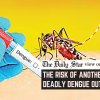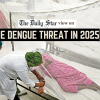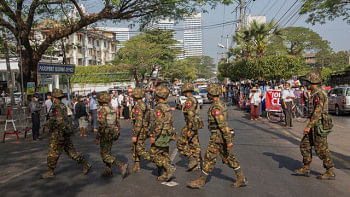Governance gaps fuelling dengue concerns

It is deeply concerning that experts are warning of a potential deadly dengue outbreak due to irregular anti-mosquito campaigns, caused by a shortage of local government representatives. Following the fall of the Awami League government, there has been significant upheaval among local government officials as noted previously by this daily. The interim government removed 12 city corporation mayors, 330 municipality mayors and administrators, and nearly all zilla and upazila parishad chairmen. Although administrators were appointed to assume the mayors' responsibilities, the resulting void has clearly not been adequately addressed.
For instance, 80 percent of councillors in the Dhaka North City Corporation and 75 percent in Dhaka South City Corporation are still absent from their duties, according to officials. As mentioned earlier in this column, their absence is causing significant problems in the delivery of several public services. Since councillors and other local administrators also play a vital role in the deployment and implementation of dengue control measures, these efforts have become even more sporadic at best.
Our dengue control measures have never been adequate to begin with. However, amidst the various issues the interim government is dealing with, the issue of dengue control seems to be falling further by the wayside. And a major contributing factor is the leadership void within city corporations and municipalities, which must to be resolved immediately.
This year, 92 people have already lost their lives to dengue, while at least 14,804 people have reportedly contracted the disease. Of these, 28 deaths and 8,505 cases were detected outside Dhaka. According to one expert, these numbers may rise significantly in the coming days due to the rain, which is creating puddles of clear water for Aedes mosquitoes to breed. As such, authorities urgently need to identify dengue hotspots and take action to prevent further cases. Moreover, surveillance, which is key to controlling Aedes mosquitoes, has been lacking even in major cities. This must be ramped up to detect active clusters and breeding sites of Aedes mosquitoes and eliminate them.
Another major concern this year has been the high case fatality rate—defined as the proportion of people diagnosed with a certain disease who end up dying from it—related to dengue. This year, the rate has increased to 0.61 percent from 0.5 percent last year. In Sri Lanka, as of July, the case fatality rate for dengue was only 0.04 percent, primarily due to the country's systematic methods and modern health management. In the long term, the interim government should consider examining what Sri Lanka is doing right and what Bangladesh is doing wrong to improve our dengue control measures and related health management, in order to prevent such a high loss of lives from the disease.


 For all latest news, follow The Daily Star's Google News channel.
For all latest news, follow The Daily Star's Google News channel. 







Comments